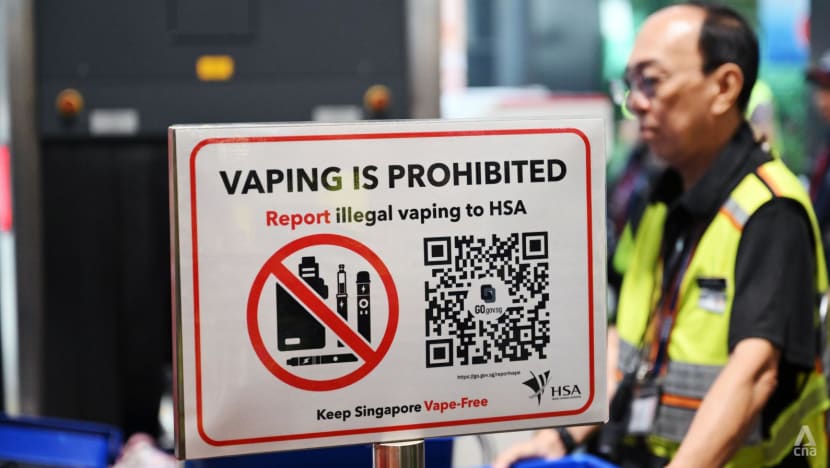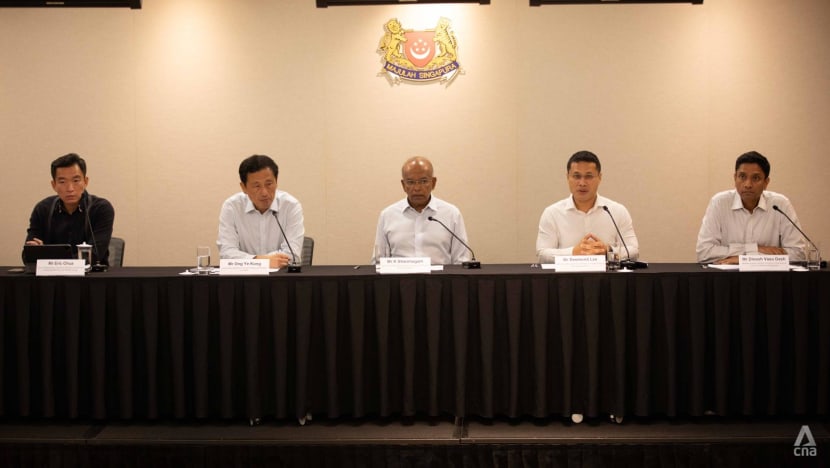- Joined
- May 16, 2023
- Messages
- 44,241
- Points
- 113
Schools get nicotine test kits as student vaping cases surge to 3,100 yearly
Public agencies, uniformed services and transport operators will also increase their checks and patrols as Singapore cracks down on vaping.
A sign put up at a bus hall in Tuas Checkpoint reminding travellers that vaping is prohibited in Singapore. (Photo: CNA/Marcus Mark Ramos)
Listen
7 min

Justin Ong Guang-Xi
28 Aug 2025 03:00PM (Updated: 28 Aug 2025 03:09PM)
BookmarkShare
Read a summary of this article on FAST.
FAST
SINGAPORE: Schools across Singapore, from primary to junior colleges, have been issued nicotine test kits amid a sharp rise in vaping among students.
The number of students caught vaping has jumped to an average of 3,100 a year between 2022 and 2024, according to new figures from the Ministry of Education (MOE). In the institutes of higher learning, about 800 students were caught a year during the same period.
ADVERTISEMENT
In contrast, fewer than 50 cases from schools and institutes of higher learning were referred to the Health Sciences Authority (HSA) before 2020.
The nicotine test kits have been issued to around 260 schools since March, following requests from schools, MOE said on Thursday (Aug 28).
All vaping incidents in educational institutions will be reported to the authorities. From Sep 1, students may face school-based penalties such as detention, suspension, caning (for boys), conduct grade adjustments and rehabilitative counselling.
In institutes of higher learning, disciplinary action could include the withdrawal of leadership opportunities, overseas exchange or scholarships, eviction from hostels for university students and fines or community service.
Repeat offenders and traffickers may be suspended or expelled.

Designated staff members will be trained and authorised to take enforcement action against students found abusing or distributing vapes, said the Ministry of Health (MOH) and Ministry of Home Affairs (MHA) in a press release.
ADVERTISEMENT
Metal detectors have been deployed at selected campuses to screen for vape devices, and schools have introduced a “peer vigilance culture”, encouraging students to report classmates who vape.
Institutes of higher learning will step up campus patrols, especially at known hotspots.
Education Minister Desmond Lee said at a press conference on Thursday that peer support plays a vital role.
"We know that young people listen to their peers, and so positive peer support is important as well. We encourage students to look for peers who are struggling with vaping and urge them to seek help from trusted adults like our teachers," he said.
This act should not be seen as "getting anyone in trouble", said Mr Lee, but instead "making sure that their friends get the much-needed help they need".
CRACKDOWN ACROSS UNIFORMED SERVICES AND PUBLIC SPACES
Beyond schools, enforcement will intensify across public areas and various settings. From Sep 1, etomidate – an anaesthetic agent found in some vapes known as Kpods – will be classified as a Class C drug under the Misuse of Drugs Act.ADVERTISEMENT
This enables tougher enforcement actions against users and suppliers, including higher fines, rehabilitation and, in the case of suppliers, mandatory caning and jail time.
Within the Singapore Armed Forces and Home Team, existing urine screening for substance abuse will be expanded to include etomidate. Both agencies have increased enforcement within their premises, including tighter checks at access points.
Public transport operators have stepped up roving patrols on trains and at transport nodes. Bus drivers have referred individuals caught vaping at bus interchanges to HSA, while Transit Security Officers have increased bag checks to detect vape devices.
At public areas, agencies such as the National Parks Board and the National Environment Agency have intensified enforcement patrols. The Singapore Police Force and the Central Narcotics Bureau have stepped up joint enforcement efforts with HSA, with offences found during routine policing also referred for investigation.
At border checkpoints, the Immigration and Checkpoints Authority has tightened screening to prevent vape smuggling.
To support enforcement, various agencies will be empowered under the Tobacco (Control of Advertisements and Sale) Act (TCASA) to seize vapes and issue notices. HSA officers will also be authorised under the Misuse of Drugs Act to investigate etomidate offences and supervise abusers.
